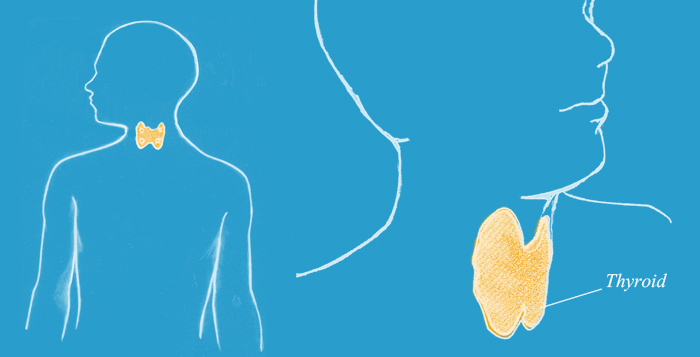
The thyroid is a small organ in your neck that plays a big role in how your body functions. It affects everything from your heart rate to your energy level. Therefore, when there is a problem with the thyroid, it affects your entire body. Thyroid problems are very common.
The thyroid is an endocrine gland located in the neck, just below the voice box. Endocrine glands produce hormones. These chemicals carry messages through the bloodstream to other parts of the body. The Thyroid gland produces thyroid hormone. It does this with help from a gland in the brain called the pituitary.
There are different types of thyroid problems. Some result from changes in how the thyroid functions. Others involve changes in the structure of the thyroid. The most common surgery that we perform is for thyroid nodules that may be benign or malignant.
Hypothyroidism
This is the most common type of thyroid problem. The primary cause of hypothyroidism is Hashimoto disease. With this condition, the body’s own disease-fighting cells, or immune system, destroy part or all of the thyroid gland.
Hypothyroidism can also be caused by surgical removal of the thyroid or by radiation therapy. Other causes include a lack of iodine in the body (rare) and damage to the pituitary gland. The condition’s low level of thyroid hormone slows the metabolism. This can cause a variety of symptoms, including:
- Tiredness, loss of energy
- Mild weight gain
- Feeling cold
- Puffiness in the face, hands, ankles, or feet
- Longer or heavier menstrual periods
- Dry skin
- Depression
- Constipation
There are different types of thyroid problems. Some result from changes in how the thyroid functions. Others involve changes in the structure of the thyroid. The most common thyroid problems are described here.
With hypothyroidism, the thyroid gland makes too little thyroid hormone. The pituitary gland responds by making more TSH. This results in a high level of TSH and a low level of thyroid hormone. Functional Thyroid Problems Most thyroid problems are related to issues with thyroid function. These problems involve an imbalance with the body’s levels of TSH and thyroid hormone. This imbalance typically causes symptoms.
Hyperthyroidism The most common cause of hyperthyroidism is Graves’s disease. This occurs when the body’s immune system causes the thyroid to grow and increase thyroid hormone output. People may also become hyperthyroid if they have a nodule or goiter. The condition’s high level of thyroid hormone speeds up the metabolism. This can lead to a variety of symptoms, including:
- Anxiety, feeling shaky
- Irregular heart rate
- Weight loss
- Feeling hot and sweaty
- Shortness of breath
- Tiredness or sleeplessness
- A change in vision, or bulging of the eyes
Pre-Operative Instructions:
- No eating or drinking after midnight the night before surgery.
- Please stop taking aspirin, Plavix, Coumadin, or any other blood thinners at least 5 days prior to your surgery day. (Please check with your primary physician prior to stopping any prescribed medications).
- Clearance from your primary doctor or a cardiologist may be required prior to your surgery especially if you have pre-existing medical problems.
- Lab work may be required prior to any scheduled procedure. This will be scheduled for you.
- Please check with anesthesiology or your primary care doctor as to which prescription medicines to take the day of surgery.
Post-Operative Instructions:
- You may resume a regular diet as tolerated.
- No heavy lifting for 2 weeks.
- Incisions will have 2 dressings, and outer dressing and an inner dressing. The outer dressing may be removed the day after surgery. The inner dressings may resemble band-aids and are called steri-strips. You may shower once the outer dressing has been removed. Leave the steri-strips in place. They will fall off on their own.
- Please call the office if you have redness or swelling around your incision or fevers. These symptoms may represent an infection.
- Driving is not permitted while on narcotic pain medicine (Vicodin) or while pain is severe. Driving is not recommended for several days after surgery.
- Pathology results are available approximately one week after surgery. Please call us if we have not called you.
- Please contact the office with any questions and to set up a follow-up appointment.